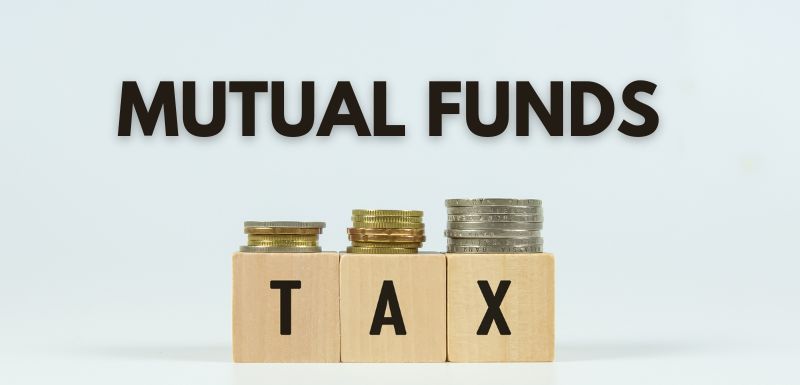Mutual Fund Taxation: Changes After Budget 2024

During Budget 2024, the Finance Minister rationalised and simplified long-term capital gain (LTCG) taxation across asset classes. Two major announcements were made for the same.
The first was to rationalise the holding period to one and two years for the categorisation of LTCG. The second was to rationalise the LTCG tax rate at 12.5%. In this article, we will discuss mutual fund taxation by listing their types and how each type is taxed.
Mutual Fund Taxation - How Mutual Funds Are Taxed?
As there have been considerable changes in the taxation for mutual funds, let us list the different types of mutual funds and how each of them is taxed.
1) Equity Mutual Funds
A mutual fund scheme that invests 65% or more of its money in domestic equity shares is categorised as an equity mutual fund.
a) Short-Term Capital Gain (STCG) Tax
When the units of an equity mutual fund are held for up to 12 months, the capital gain is categorised as short-term capital gain (STCG). The STCG tax is levied at 20%.
b) Long-Term Capital Gain (LTCG) Tax
When the units of an equity mutual fund are held for more than 12 months, the capital gain is categorised as long-term capital gain (LTCG). The first Rs. 1.25 lakhs LTCG in a financial year are exempt. The incremental LTCG is taxed at 12.5% without the indexation benefit.
Along with equity mutual funds, the above STCG and LTCG taxation applies to equity ETFs, hybrid funds and arbitrage funds also where the equity component is 65% or higher.
2) Debt Mutual Funds
A mutual fund scheme that invests 65% or more of its money in debt and money market securities is categorised as a debt mutual fund.
In the case of debt mutual funds, irrespective of the holding period, the capital gains are added to the individual’s overall income and taxed at the slab rate.
Along with debt mutual funds, the above taxation applies to debt ETFs and hybrid funds also where the debt component is 65% or higher.
3) Gold ETFs and FoFs
These include Gold Exchange-Traded Funds (ETFs) and Gold Fund of Funds (FoFs). A gold FoF invests in the units of a gold ETF. In India, gold FoFs are also commonly referred to as gold mutual funds.
a) Short-Term Capital Gain (STCG) Tax
As the units of Gold ETFs are listed on the stock exchanges, the holding period of listed securities will apply for the categorisation of capital gains into STCG and LTCG. When the units of a Gold ETF are held for up to 12 months, the capital gain is categorised as short-term capital gain (STCG). The STCG will be added to the individual’s overall income and taxed at the slab rate.
As the units of the Gold Fund of Funds (FoFs) are not listed on the stock exchanges, the holding period of unlisted securities will apply for the categorisation of capital gains into STCG and LTCG. When the units of a Gold FoF are held for up to 24 months, the capital gain is categorised as short-term capital gain (STCG). The STCG will be added to the individual's overall income and taxed at the slab rate.
b) Long-Term Capital Gain (LTCG) Tax
When the units of a Gold ETF are held for more than 12 months, the capital gain is categorised as long-term capital gain (LTCG). The LTCG tax is levied at 12.5% without the indexation benefit.
When the units of a Gold Fund of Funds (FoFs) are held for more than 24 months, the capital gain is categorised as long-term capital gain (LTCG). The LTCG tax is levied at 12.5% without the indexation benefit.
4) International Mutual Funds
An international mutual fund invests its money in equity shares of companies listed on stock exchanges outside India.
a) Short-Term Capital Gain (STCG) Tax
When the units of an international mutual fund are held for up to 24 months, the capital gain is categorised as short-term capital gain (STCG). The STCG will be added to the individual’s overall income and taxed at the slab rate.
If it is an international equity ETF listed in India, the holding period considered will be up to 12 months for the categorisation of capital gain as STCG.
b) Long-Term Capital Gain (LTCG) Tax
When the units of an international mutual fund are held for more than 24 months, the capital gain is categorised as long-term capital gain (LTCG). The LTCG tax is levied at 12.5% without the indexation benefit.
If it is an international equity ETF listed in India, the holding period considered will be more than 12 months for the categorisation of capital gain as LTCG.
5) Hybrid Mutual Funds
In the earlier sections, we have discussed the taxation of hybrid funds where either the equity component or the debt component is more than 65%. However, there are certain hybrid and multi-asset class mutual fund schemes where the equity component is less than 65% and the debt component is also less than 65%. Let us see how these hybrid funds are taxed.
a) Short-Term Capital Gain (STCG) Tax
When the units of a hybrid mutual fund are held for up to 24 months, the capital gain is categorised as short-term capital gain (STCG). The STCG will be added to the individual’s overall income and taxed at the slab rate.
If it is a listed hybrid ETF, the holding period considered will be up to 12 months for categorisation of capital gain as STCG.
b) Long-Term Capital Gain (LTCG) Tax
When the units of a hybrid mutual fund are held for more than 24 months, the capital gain is categorised as long-term capital gain (LTCG). The LTCG tax is levied at 12.5% without the indexation benefit.
If it is a listed hybrid ETF, the holding period considered will be more than 12 months for categorisation of capital gain as LTCG.
Factors Influencing Taxation for Mutual Funds
Some of the major factors influencing the taxation of mutual funds include:
1) Type of Financial Instrument
The taxation differs among asset classes and even within the asset class. The various asset classes include domestic equity, fixed-income, gold, real estate, international equities, etc.
Within gold as an asset class, different ways of buying it include physical gold, ETFs, mutual funds, sovereign gold bonds, etc. The gold taxation varies depending on whether it is bought in physical form or electronic form.
2) Listed/Unlisted
The taxation of an asset class depends on whether it is listed or not. For example, the taxation of listed equities is different from unlisted equities.
3) Holding Period
The taxation varies with the holding period. The holding period determines whether the capital gains are short or long-term and taxed accordingly.
Make Tax Planning a Part of Overall Financial Planning
Budget 2024 has done a good job of rationalising and simplifying tax on mutual funds. Some people invest based on the tax benefits at the time of investment and taxation on maturity/redemption. However, that is not the right approach to investing. You must work with an investment expert who can help you list your financial goals and make a goal plan to achieve them. While investing towards your financial goals, make sure the financial products chosen are tax-efficient. Tax benefits should be one of the enablers for investing towards financial goals and not the only reason for investing. Hence, tax planning should be a part of your overall financial planning.
FAQs
Can You Show Mutual Fund Taxation With an Example?
Let us understand the tax on mutual fund returns with the help of an example.
Sheetal invested Rs. 7.5 lakhs in a diversified equity fund. After two years, her investment was worth Rs. 9 lakhs. She needed money for her daughter’s higher education and hence redeemed the mutual fund units. Let us see how the capital gain tax will be calculated in this case.
Purchase price of mutual fund units: Rs. 7.5 lakhs
Redemption value of mutual fund units: Rs. 9 lakhs
Capital gain = Rs. 9 lakhs – Rs. 7.5 lakhs = Rs. 1.5 lakhs
Holding period: More than one year (Sheetal redeemed her mutual fund units after two years)
Hence, in this case, the long-term capital gains (LTCG) tax will be applicable.
From the LTCG of Rs. 1.5 lakhs, the first Rs. 1.25 is exempt.
The remaining Rs. 25,000 LTCG will be taxed at 12.5% without indexation.
The LTCG tax will be Rs. 3,125
Your Investing Experts
Relevant Articles
How To Select The Best Mutual Funds For Long Term Goals
Mutual funds offer a compelling way to invest for long-term goals, leveraging professional management and diversification to potentially achieve significant returns. But with a vast array of options available, selecting the best mutual funds for the long term can feel daunting. This guide will equip you with the knowledge to confidently navigate the mutual fund landscape and learn how to select the best mutual fund aligned with your long-term aspirations.
Should You Continue Your SIP in Small Cap Mutual Funds
Investing in small cap funds requires patience and discipline, especially during market corrections. By staying committed to your SIPs and focusing on long-term goals, you can leverage the power of rupee cost averaging and compounding. Don’t let short-term market noise dictate your strategy—remain focused, stay the course, and trust that your disciplined approach will yield results over time.
Systematic Withdrawal Plans (SWP): A Reliable Way to Generate Regular Income
An SWP allows investors to withdraw a predetermined amount from their mutual fund investments at regular intervals, such as monthly, quarterly or annually. The beauty of SWPs lies in their flexibility—they provide consistent income while allowing the remaining investment to continue growing.
.png)


_(2).jpg)